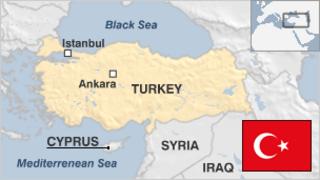Turkey country profile
Once the centre of the Ottoman Empire, the modern secular republic was established in the 1920s by nationalist leader Kemal Ataturk.
Straddling the continents of Europe and Asia, Turkey’s strategically important location has given it major influence in the region – and control over the entrance to the Black Sea.
Progress towards democracy and a market economy was halting after Ataturk’s death in 1938, and the army – seeing itself as guarantor of the constitution – repeatedly ousted governments seen as challenging secular values.
Joining the European Union has been a longstanding ambition. Membership talks were launched in 2005, but have stalled over serious misgivings about Turkey’s human rights record.
Kurds make up about a fifth of the population. Kurdish separatists who accuse the Turkish state of seeking to destroy their cultural identity have been waging a guerrilla war since the 1980s.
FACTS
Republic of Turkey
Capital: Ankara
Population 79.5 million
Area 779,452 sq km (300,948 sq miles)
Major languages Turkish (official), Kurdish
Major religion Islam
Life expectancy 72 years (men), 79 (women)
Currency Turkish lira
LEADERS
President: Recep Tayyip Erdogan
Recep Tayyip Erdogan won a new term in elections in June 2018 and also gained substantial new powers under a new system approved the previous year by voters.
He first came to power in 2003 in the wake of a sweeping electoral victory by the Islamist-rooted Justice and Development Party (AKP), of which he was a founding member.
He spent 11 years as Turkey’s prime minister before becoming the country’s first directly-elected president in August 2014 – a supposedly ceremonial role.
To his supporters Mr Erdogan has brought Turkey years of economic growth, but to his critics he is an autocratic leader intolerant of dissent who harshly silences anyone who opposes him.
In July 2016, the AKP government survived an attempted coup which saw clashes on the streets of Istanbul and Ankara that left 256 people dead.
The authorities subsequently detained thousands of soldiers, judges, teachers and civil servants on suspicion of involvement in the attempt, which President Erdogan said was inspired by his exiled opponent Fethullah Gulen.
A referendum in April 2017 narrowly backed switching to a presidential system of government, which significantly increased Mr Erdogan’s powers.
MEDIA
Turkey’s airwaves are lively, with hundreds of private TV and radio stations competing with the state broadcaster, TRT.
Television is by far the most influential news medium; both press and broadcasting outlets are operating by powerful business operators.
For journalists, the military, Kurds and political Islam are highly-sensitive topics, coverage of which can lead to arrest and prosecution.
Some of the most repressive restrictions have been lifted on the path to EU entry, but it remains a crime to insult the Turkish nation and president, and a wave of prosecutions of journalists under Recep Tayyip Erdogan has prompted new concern for press freedom.
TIMELINE
Some key dates in Turkey’s history:
1453 – Sultan Mehmed II captures Constantinople, ending Byzantine Empire and consolidating Ottoman Empire in Asia Minor and Balkans.
15th-16th centuries – Expansion into Asia and Africa.
1683 – Ottoman advance into Europe halted at Battle of Vienna. Long decline begins.
1908 – Young Turk Revolution establishes constitutional rule, but degenerates into military dictatorship during First World War, where Ottoman Empire fights in alliance with Germany and Austria-Hungary.
1918-22 – Partition of defeated Ottoman Empire leads to eventual triumph of Turkish National Movement in war of independence against foreign occupation and rule of Sultan.
1923 – Turkey declared a republic with Kemal Ataturk as president. Soon afterwards it becomes secular.
1952 – Turkey abandons Ataturk’s neutralist policy and joins Nato.
1960 – Army coup against ruling Democratic Party.
1974 – Turkish troops occupy northern Cyprus, partitioning the island.
1984 – Kurdish PKK group launches separatists guerrilla campaign which develops into a major civil war that simmers on for decades.
2011 – Syrian civil war breaks out, resulting in tension along the countries’ border and a huge influx of refugees into Turkey.
2016 – Attempted coup fails.
2017 – Referendum approves switch to presidential system.
Source: Read Full Article



